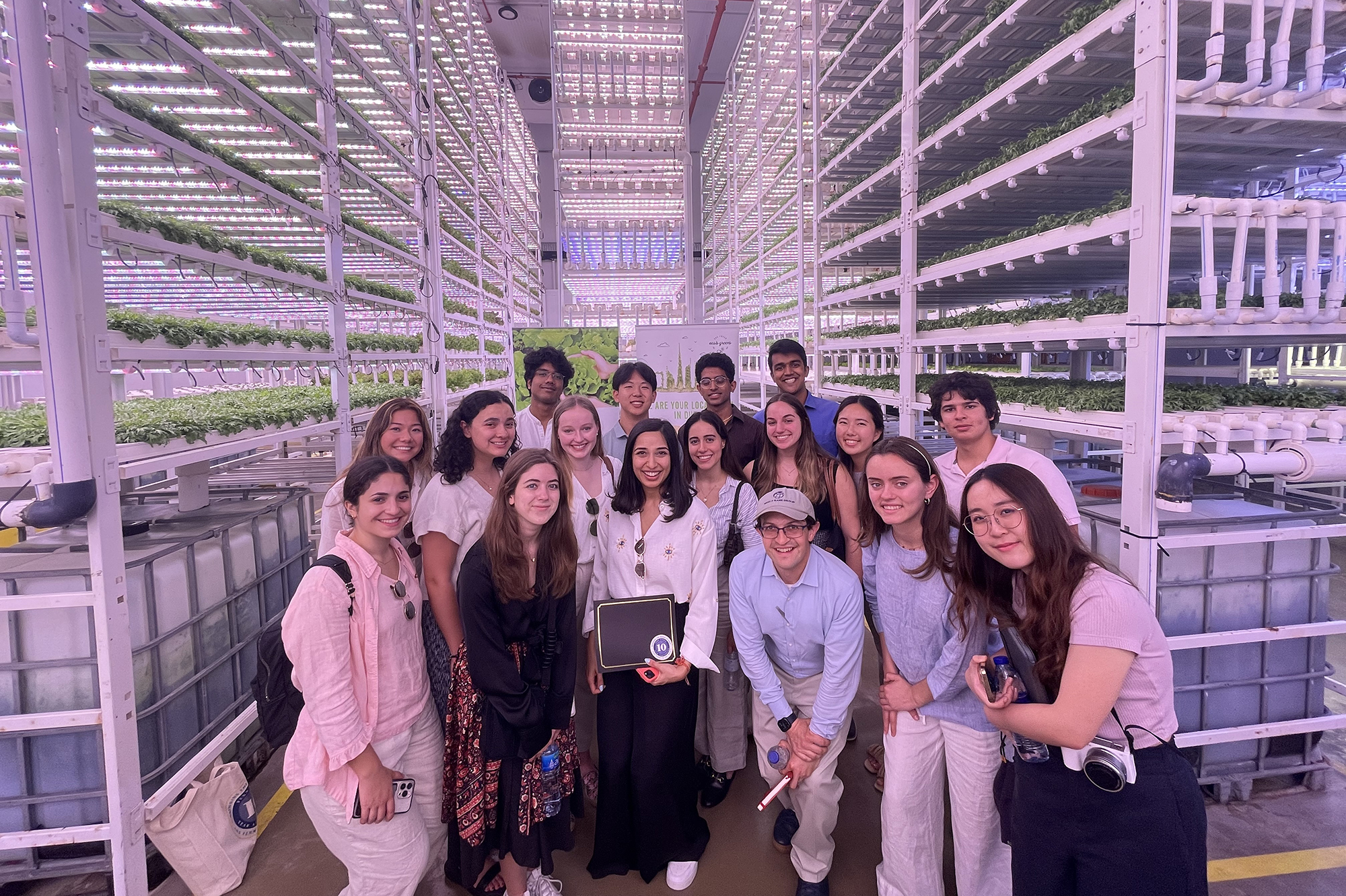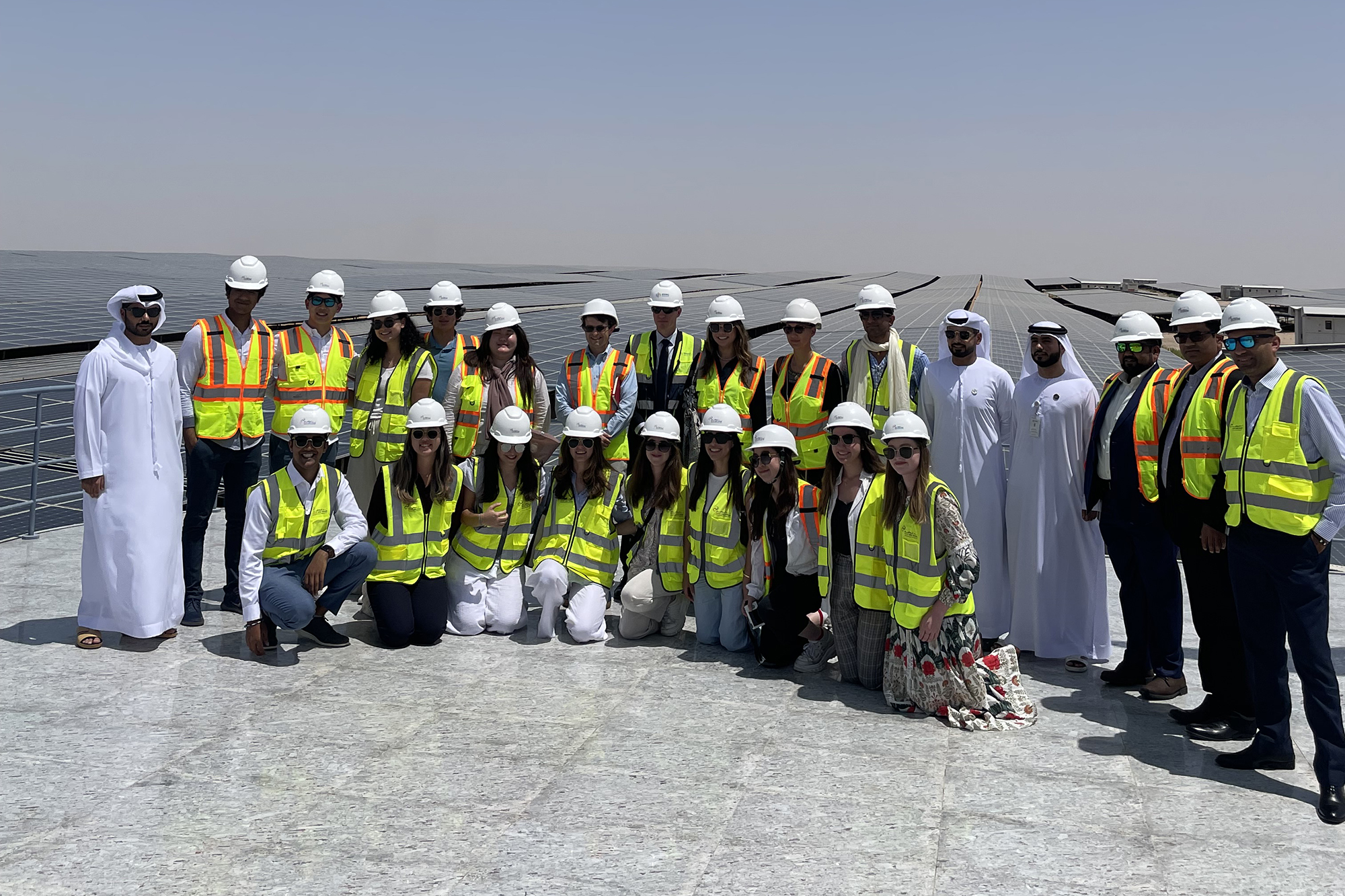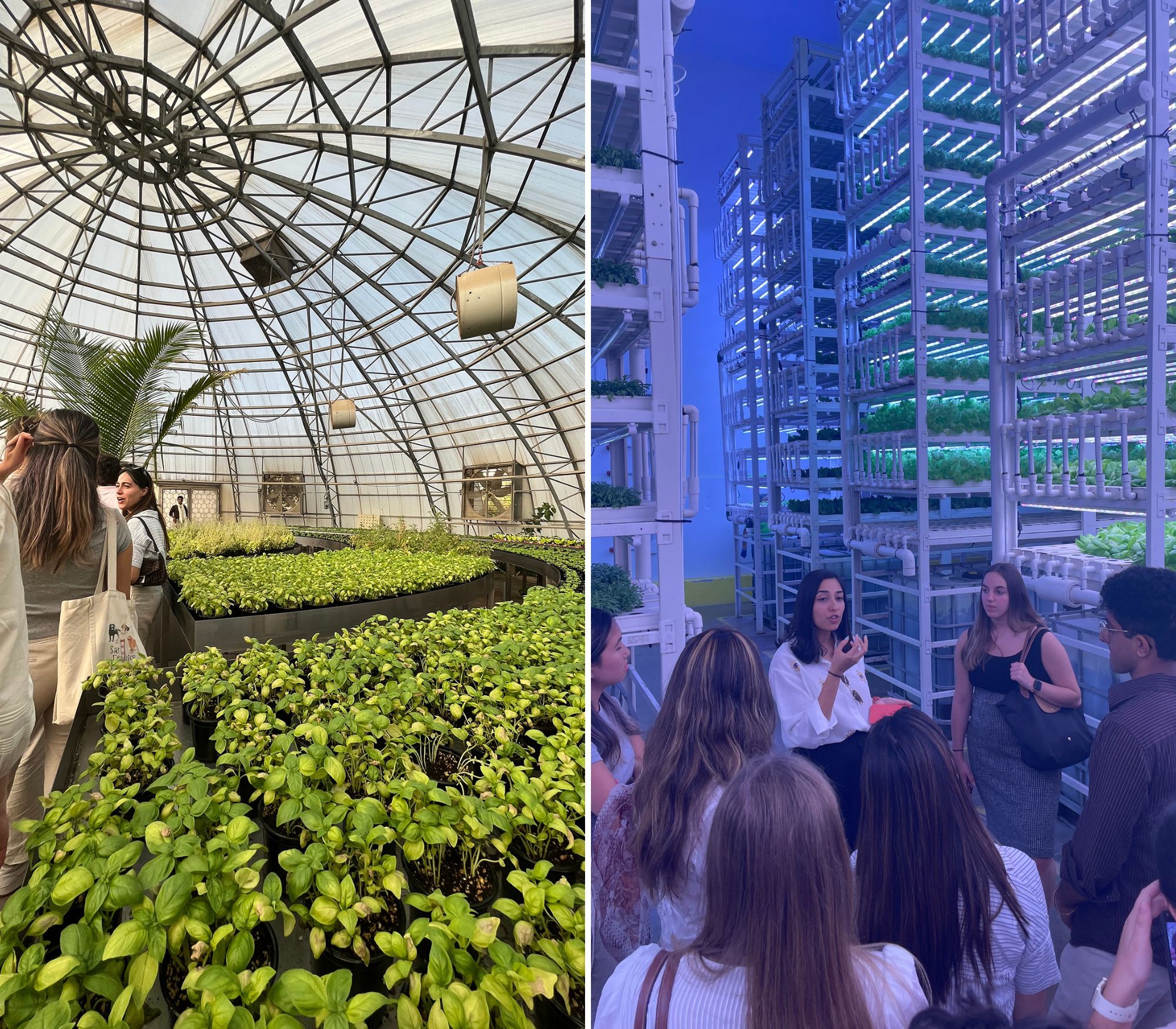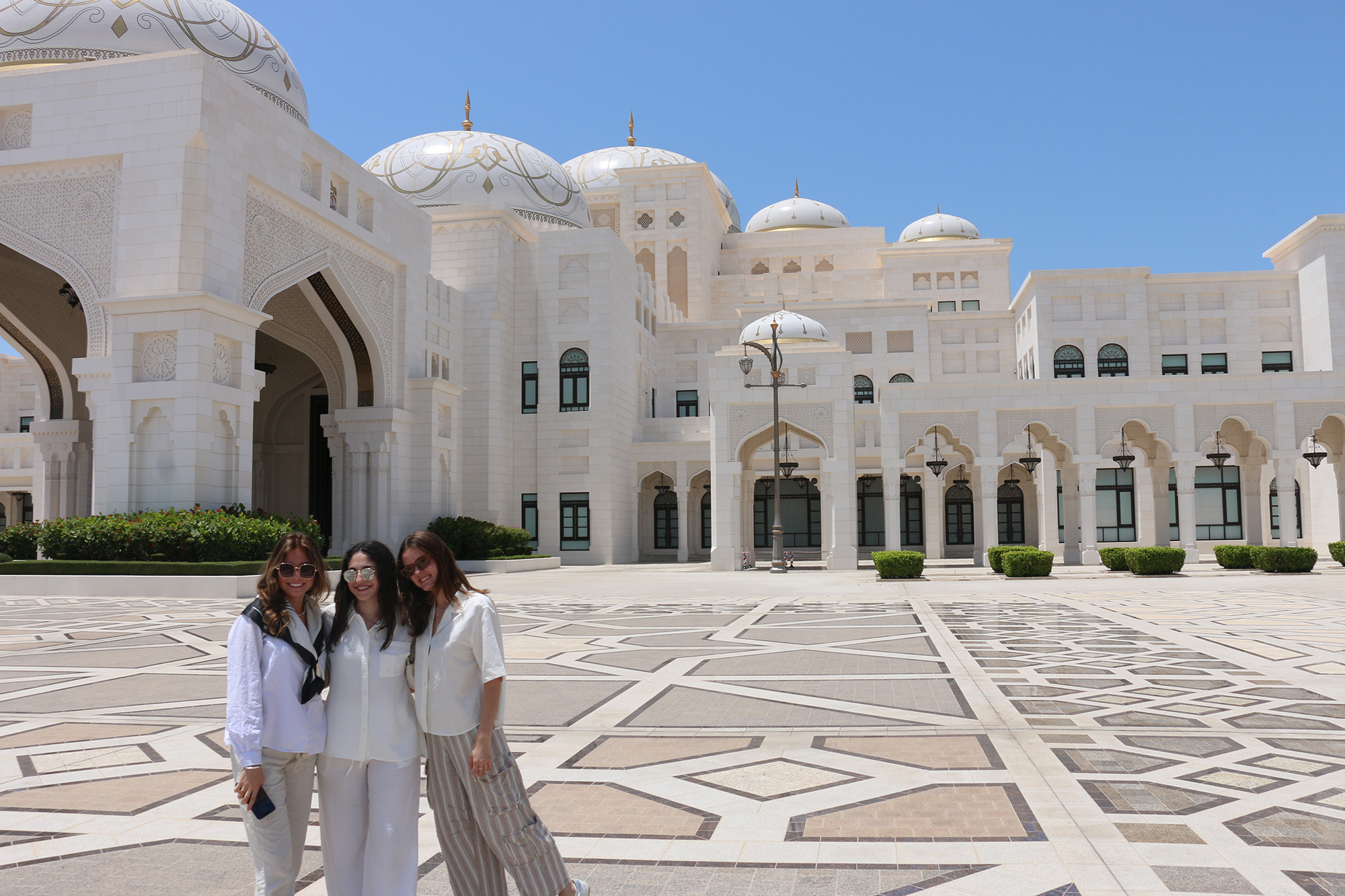
China’s climate policy is arguably one of the most important factors in the global transition away from fossil fuels. The world’s largest emitter of greenhouse gas, China has pledged to curb its reliance on fossil fuels, and in 2020 set ambitious climate commitments for itself.
For Penn students interested in the driving forces behind China’s climate change policy, a new Penn Global Seminar last semester offered them an “only at Penn” experience: the chance to dive into the topic in the classroom and hear from top experts in the field. This included an opportunity to travel to the United Arab Emirates to see firsthand some of the solar energy projects largely financed by Chinese entities, as well as other cutting edge sustainability efforts in UAE, which is hosting the 2023 United Nations Climate Change Conference, known as COP-28, in November.
Taught by Scott Moore, director of China Programs and Strategic Initiatives as part of Penn Global, the seminar—Can China Stop Climate Change? Politics, Geopolitics, and China’s Role in the World’s Renewable Energy Transition—examined China’s climate positions and policies, as well as barriers and challenges related to meeting its ambitious commitments.
“Climate change is a fundamentally global issue, and I wanted students to see firsthand how other countries approach the challenge of decarbonization, both from a political, economic, and technological perspective,” he says. Moore has taught the course before, but this was the first time it included a travel component.
Although the class itself focused on China, travel there wasn’t possible at the start of the semester. Traveling to UAE let the students dive into another authoritarian, fossil fuels-dependent economy that is nonetheless planning for a post-carbon future, Moore says. The seminar is part of the pilot phase of the China Education Initiative, which provided enrolled students with the opportunity to engage with key questions and issues related to China and UAE through the travel component from May 12-21.
They visited places like Noor Abu Dhabi, the world’s largest single-site solar power plant; a vertical hydroponic farm launched by a Penn alumna; Emirates Water and Electricity Company; and Dubai Sustainable City. But they also were treated to a traditional Emirati breakfast in an Emirati household; perused the collection of Louvre Abu Dhabi; soaked in the beauty of the Sheikh Zayed Grand Mosque and the vastness of desert and dunes outside Dubai; and explored the world’s tallest building, Burj Khalifa.
“As a true nerd, the highlight for me was a visit to the Al Noor solar farm, currently the world’s largest,” Moore says. “It was inspiring, and almost breathtaking, to see solar panels stretching almost as far as the eye could see.”
Another highlight for the students and Moore as well was getting to meet with Penn alumni, including one who is a senior official in the UAE government, and another who is a recent graduate and sustainability entrepreneur.
“It was great for the students to see these potential role models,” he says.
Invaluable on-the-ground experience
Rising Wharton School third-year Gabriella Gibson hails from Ebensburg, Pennsylvania, in the heart of the state’s coal country, which she says was part of the reason for her interest in the course. “Growing up in a former coal-mining town, I witnessed firsthand the devastating impact that fossil fuels can have on the environment,” she says. “There’s so much development going on within the renewable energy space, it’s a really exciting field to be interested in right now.”
Her concentrations at Wharton are environmental, social, and governance as well as business economics and public policy.
Gibson says learning about China’s climate change policies and practices in class was rewarding, especially hearing from the array of expert guest speakers, and witnessing those technologies firsthand was invaluable.
“It’s a completely different experience to actually go on ground and learn from the world’s leading energy experts, to walk around the largest solar power plant, to visit a vertical hydroponic farm,” she says. “It solidifies all the lessons that you’ve learned in class and just takes that learning a step deeper.”
Seeing the connections between China’s investments in UAE’s energy projects and other aspects where the two overlapped “allowed our class to compare and contrast the two systems, not only to each other but also to the U.S.,” Gibson says.
One of her favorite moments in the trip was a trip to Geap International, and visiting their hydroponic vertical farm called Oasis Greens with founder Nikita Patel, who’s a Penn and Wharton alumna. “It was inspiring to meet a Penn graduate who is successfully conducting business as a woman in the UAE.”
Gibson says she was drawn to the course by its title asking if China can stop climate change, and says she hoped by the end of it she would be able to answer that question herself: if the globe can truly meet the necessary threshold to stop global warming.
“My biggest takeaway is that we can be cautiously optimistic about achieving our energy targets,” Gibson says. “There’s a lot of investment in the renewable energy space; there are a lot of exciting technologies being developed. If we can have global collaboration like we see between China and the UAE, where they can invest in each other and borrow technologies, it’s not unreasonable to think that we might be able to reach those climate targets.”
The importance of international cooperation
Rising third-year Jennifer Frank, of New York City, is majoring in philosophy, politics and economics, with a concentration in globalization. The opportunity for global immersion and global learning was one of the main draws for her to attend Penn, she says.
“I was really excited when I saw this class listed as a global seminar. I would’ve taken this class even without a travel component because the topic is so interesting to me. But to both learn from Professor Moore, who is at the top of this field, and the incredible guest lecturers and then have a global immersion opportunity in addition … honestly it was the perfect class,” Frank says.
The knowledge gained from hearing professional speakers throughout the semester, rather than just reading a textbook, was invaluable, Frank says, as was having Moore as the instructor. “He could really lecture from a first-person perspective—he went to the Paris Accords—just to be able to ask him questions about his experiences was an incredible opportunity,” she says.
The same could be said for the trip, Frank says. “Some of the best things that we did were speaking with people and just having an hour of their time. Everyone was so incredibly welcoming with both their time and their wealth of knowledge.”
Frank points to the traditional breakfast in the Emirati household as setting the tone for the trip to come. “A lot of the experiences that we had were due to the Penn alumni network; it was just incredible,” she says.
China’s influence is vast, and Frank saw the Middle East as a center that has both relations with the West and the East, where much of what they learned in class complemented their on-the-ground experiences.
“This class and trip showed me that the climate crisis is something that must be addressed through international cooperation. It cannot be just the U.S.; It cannot just be China. It has to be a worldwide effort, to take significant action to mitigate and decrease climate change,” Frank says.
Moore was struck by how deeply the students were engaged in learning and experiencing as much as possible, in class and especially on the trip.
“Climate change is an issue that touches almost every fact of modern life, and one that animates an increasing amount of what we do at Penn in terms of research, teaching, service, and policy engagement,” Moore says. “As I told the students in our final class, I hope the experience both of the course and the trip provided some insights into a phenomenon that will profoundly shape the world in the decades to come, and highlighted some ways that students can be part of one of the most remarkable things humans have ever attempted to do, namely to decarbonize the world economy.”











